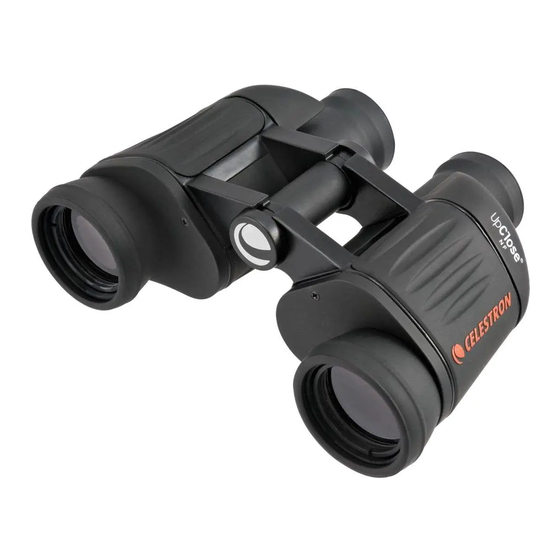Celestron 71300 Gebruikershandleiding
Blader online of download pdf Gebruikershandleiding voor {categorie_naam} Celestron 71300. Celestron 71300 5 pagina's. Celestron 71300: user guide

Thank you for purchasing Celestron binoculars and we hope you will have many years of pleasure with them. To maximize your enjoyment of the binoculars, please
read these instructions on use and care before using them.
1.
Adjusting the Interpupillary Distance (IPD)
Since the distance between the eyes (specifically, the distance between the centers of the pupils) varies among individuals, the two eyepieces of the binoculars must be
correctly aligned (adjusted). This is called adjusting the interpupillary distance. To adjust this distance, lift the binoculars up to your eyes (using both hands) and look
through them at an object in the distance. Move the two halves of the binoculars about the hinge until you see one clear circle of image through both eyes.
2.
Adjusting Focus (see note below if you have the UpClose No Focus models)
Since most people have a variance of vision from their left eye to their right eye, you must adjust the focusing system.
Use the following steps to achieve focus: (1) Close your right eye and look through the left side of the binoculars
with your left eye at the subject matter. Rotate the center focusing wheel until the image appears in sharp focus; (2)
Close your left eye and look through the right eyepiece (called the diopter). Rotate the right eyepiece until the image
appears in sharp focus; (3) Now look through both eyepieces with both eyes open. Since you've already adjusted the
right eyepiece, use only the center focusing wheel to refocus on a new object at a different distance.
Note: If your binocular has a diopter indicator, please note the setting for later use for faster focus adjustment.
For Zoom Binocular models ---- to increase or decrease power, move the zoom lever. To adjust focus you first
zoom the binoculars to the highest power and then adjust the focusing system as above. Then, when zooming in and
out your binoculars will be in focus.
Hint: Eyeglasses worn for nearsightedness should be worn when using binoculars as you may not be able to
reach a sharp focus at infinity without them.
Note for owners of UpClose No Focus Binoculars – these binoculars have the focus fixed so that after adjusting the IPD (discussed above), you just pick
them up and use them. If you wear eyeglasses for nearsightedness, you should use them with these binoculars. Also, the collimation may be slightly off if the
vision in your two eyes is slightly different.
3.
Set the Rubber Eyecups
Leave the Rubber Eyecups up if you do not wear eyeglasses but fold them down if you do wear eyeglasses to obtain the maximum field of view. When done observing,
fold the eyecups up for storage.
4.
Tripod Adaptability
Some binoculars feature a built-in tripod adapter fitting. On these models, a threaded screw hole is underneath a cap. To attach a binocular tripod adapter, remove the
cap and then thread the screw from the binocular tripod adapter into the threaded screw hold. The other end of the binocular tripod adapter attaches to a photographic
tripod. Mounting binoculars this way allows for added stability and comfort especially when viewing at high powers.
Diopter
Adjustment
Objective Lens
Roof Prism Binocular
5.
Care and Cleaning
Binoculars do not need routine maintenance other than making sure that the objective lenses and eyepieces are kept clean. If repairs become necessary, they should be
serviced by the manufacturer or a qualified binocular repair company. Collimation (optical alignment) is the biggest concern with binoculars. If your binoculars are
roughly handled or dropped, there is a good chance that the collimation will be out and they should be serviced. Dirty objectives and/or eyepieces mean less light
transmission and loss of brightness as well as unsharp images. Keep your optics clean! When not using your binoculars store them in the case provided. Avoid
touching the glass surfaces but if fingerprints (which contain mild acid) get on them, they should be cleaned as soon as possible to avoid damaging the coatings. To
clean the optical surfaces, we recommend a lens/optics cleaning kit available at most photo or optical shops and follow the instructions provided closely. If you have a
lot of dust or dirt accumulated, brush it off gently with a camel's hair brush and/or utilize a can of pressurized air before using the cleaning kit. Alternately, you could
use the Celestron LensPen (# 93575) made especially for cleaning binoculars. Never attempt to clean your binoculars internally or try to take them apart!
6.
Caution! Viewing the sun may cause permanent eye damage. Do not view the sun with your binoculars or even with the naked eye.
7.
Problems or Repair
If warranty problems arise or repairs are necessary, contact the Celestron customer service department if you live in the U.S.A. or Canada. If you live elsewhere, please
contact the Celestron dealer you purchased the binoculars from or the Celestron distributor in your country (listings on the Celestron website).
8.
Warranty
Your binocular has the Celestron No Fault Limited Lifetime Warranty for U.S.A. and Canadian customers. For complete details of eligibility and for warranty
information on customers in other countries visit the Celestron website.
2835 Columbia Street • Torrance, CA 90503 Tel. 310-328-9560 website
Celestron Binoculars
Now you are ready to use your binoculars --- enjoy the view!
Eyepiece
Zoom Lever (for
Zoom Models)
Focuser
Objective Lens
Tripod Adapter Thread
Diopter
Adjustment
Porro Prism Binocular
www.celestron.com
Eyepiece
Focuser
01-2010
